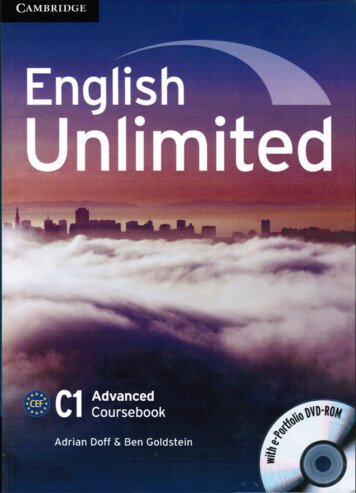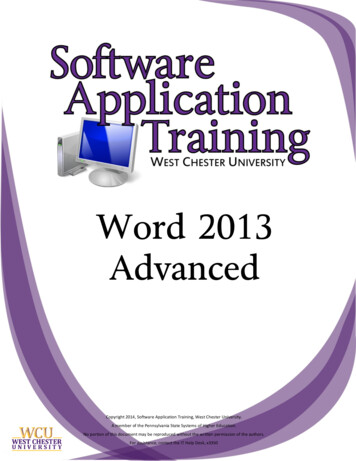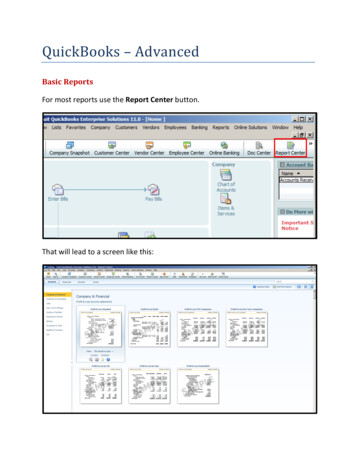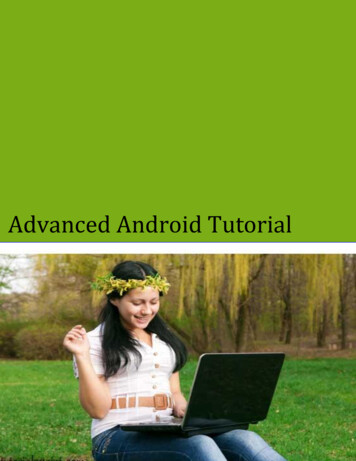
Transcription
C a m b r id g e*CEF* AdvancedCoursebookAdrian Doff & Ben Goldstein
GoalsChildhoodpages6-15 ta lk about adapting to differentcultures ta lk about m em ory ta lk about a personal m em ory evoke the feelings and moodsof a past eventLanguageSkillsExploreLanguage focusReadingAcross culturesAdapting to anothercu ltu re p7Rem em bering p9Talking about apersonal m em oryp10Born everywhere, raised inBritain p6Childhood memories arefairytales p8Target activityDescribe a childhood memory ta lk about personality tra its ta lk about identity understand prom otionallanguage say how you m et someone use effective introductionstrategiesTarget activityDescribing habits andtendenciesEXPLORESpeakingM em ory p8Childhood m em ories p 10 te ll an anecdote effectively keep people interested in a storySpeakingLook again OAdapting to another culturep7pages16-25KeywordsListeningHow w e ll do you rem em berthings? p8Your e arliest m em ory p9SelfAttitudes to childrenGrammarwouldusing the -ing formVocabularyM emoryju s tLanguage focusReadingAcross culturesPresenting a selfimage p16Talking about identityYour online self p16Dating agencies p i 8Your cardsListeningKeyW OrdS Describing s k ill anda bilitypi 7P rom otionallanguage p 19Say how you metsomeone p 19Introductionstrategies p20Promote yourselfWhat defines you? p 17Introducing yourself p20SpeakingYour online self p16What defines you as aperson? p17W riting and SpeakingSay how you m et someonepi 9EXPLOREWriting w rite a cover le tte r describe experience and abilityLook again OGrammarVerb tenses in narrationPhrasal verbs; verbs prepositionsVocabularyselfR eform ulating what you saypages26-35Language andliterature describe a book give a personal response ta lk about languages and waysto learn them describe experiences oflanguage learning discuss plans and p rio ritie sLanguage focusSpeaking and ReadingAcross culturesDescribe a book andits significance p27Language learningp28Plans and prioritie sp30Life-changing books p26Language learning p29Attitudes to EnglishListeningFarthest North p27Language learning p28Plans and p rio ritie s p30SpeakingDescribing books and th e irsignificance p27Target activityA plan to improve your EnglishKeywords worth,worthwhileEXPLORESpeaking use strategies fo rcom m unicating effectivelyLook again OGrammarPresent verb form sAdverbsVocabularyExpressions w ith languageIdioms about speakingWorldpages36-65 in te rp re t maps and facts make com parisons and talkabout changes ta lk about diet and n u tritio n discuss changing trends ta lk about resultTarget activitySay how a town or country haschangedLanguage focusReadingAcross culturesDifferences andchanges p37Interpreting meaningp37Types of food p38Changes and trendsp39Result pAOMaps of the w orld p36N utrition transition p39RestaurantsListeningEvents and changes inBritain pAOSpeakingMaps of the w orld p37Interpreting a map p37Food fo r a week p38Technology debate p39Keywords get, becomeEXPLOREWriting@ w rite captions w rite econom icallyLook again OGrammarW ritingThe futureCom parisons involving differentverbs and tim esMaps of the w o rld p37VocabularyChangesCause and effect
pages46-55GoalsLanguageSkillsExploreConcepts of spaceLanguage focusReadingAcross culturesDescribing spacesp47Legal and illegalactivities p49Com menting onexperiences p49O utlining problem sp50Post-it cities p46Surveillance p48Privacy describe spaces in cities describe how spaces are used ta lk about crim e andsurveiltance com m ent on experiences outline problem s discuss and suggest solutionsTarget activityPlan a city squareListeningPost-it city p47Security p49SpeakingTalking about spaces p47Com menting onexperiences p49Keyword needEXPLORESpeaking give a presentation w ith imagesLook again OGrammarPassive reporting verbsVocabularyDescribing placesSolutions to problem sAppearancespages56-65 describe appearance andchanges to appearance discuss photos and images ta lk about aim and intention ta lk about fakes and forgeries convince people and expressdoubt conduct a personal interview describe someone's life,achievements and attitudesLanguage focusReadingA ltering physicalfeatures p57Aim and intention p57Fakes and forgery p58Thin, pretty and airbrushedp56The m aster forger p58Paulo Coelho p60Reading and SpeakingFake photos p57ListeningThe camera never lies? p56John Myatt, the m asterfo rg e r p59Target activitySpeakingReal or fake? p59Interview someone andpresent a profileAcross culturesPiracyKeywords aim, purposeEXPLOREWriting use w ritte n and spoken stylesappropriately appreciate w ritte n and spokengenresLook again OGrammarPresent perfect sim ple andprogressivePresent participle expressionsVocabularyNew crim esVerbs w ith -en and en-Healthpages66-75 ta lk about health problem s andtreatm ent describe and com m ent on anexhibition o r a show describe a process orexperim ent discuss im plications andsignificance discuss an issueLanguage focusReadingAcross culturesHealth problem s andtrea tm e nt p66Descriptive particlesp67Describing processesand experim entsp68Discussing issues p70Cradle to grave p66Beware w itch doctors p68Health campaignsTarget activityListeningAudio guide p67Malaria p70SpeakingAn exhibition o r a show p67Mind over m atte r p69Keywords consist, includeEXPLORESpeaking take tu rn s in a discussion give opinions in an extendedconversationLook again OSpeaking and ListeningGrammarA caffeine experim ent p68Passives and participlesReferencing and substitutionGlobal issuesVocabularyTestsA ll-purpose nounsHealth problem s and treatm entsBrand awarenesspages76-85 discuss brands describe effects and influences ta lk about the image andqualities of products ta lk about advertising andm arketing describe an advert pass on detailed inform ationTarget activitySell a productLanguage focusReadingAcross culturesEffects and influencesp77Image and qualitiesp77M arketing w ords p78Describingtechnology p80V iral ads p78The air-pow ered car p80MegabrandsListeningBrands p76A vira l video p79SpeakingBrand im ages p77Describing an advert p79Keywords effect, affectEXPLOREWriting use advertising languageLook again OGrammarM easuring differenceswhateverVocabularyM ulti-w ord expressionsInfluence and effect
pages86-95GoalsLanguageSkillsExploreIconsLanguage focusReadingAcross culturesInterpreting anddefining p86C ritical language p88Saying what thingsand peoplerepresent p90Family story p87 speculate about images andobjects in te rp re t and respond to a story discuss icons identify critica l language in atext ta lk about what som ethingrepresents present argum ents andcounter-argum entsIcons for todaypages96-105 describe groups andm em bership describe feelings aboutbelonging give opinions em phatically explore strategies fo r analysingauthentic texts persuade others to take actionIconic: the overused adjectivep88ListeningInterpreting a painting p86Shepard Fairey p90Target activityA sense of belongingSpeaking and ReadingLoan wordsKeytNOrdS Describing what thingsrepresentEXPLORESpeaking give criticism respond to criticismSpeakingLook again OSymbols and associationsp86Interpreting images p86A fam ily anecdote p87Iconic people and things p89GrammarLanguage focusReadingBelonging to a groupp97Talking aboutm em bership p97Being em phatic p99Football p98ListeningI t’s n o .Modifying a sentenceVocabularyUses of supposeAcross culturesFootball rivalriesK e y w o rd togetherA sense of belonging p97Listening and SpeakingEXPLOREWritingSpeaking describe an organisation present som ething in the bestpossible lightGroups p96Opinions about fo o tba ll p99Look again OJoining a group p97Target activityGrammarPrepare a campaignInversionVocabularyCollective nouns fo r peopleCollective adjectivesClimatepages106-115 ta lk about clim ate change describe inventions and howthey w ork discuss proposals describe an ongoing process understand im agery in a poem say if actions are ju stified conduct a debateLanguage focusReadingAcross culturesClim ate change p 106Active and passiveinfinitives p 107Processes p 109Saying if actions areju stified p110The Serm ilik fjord inGreenland p1082084 p109Living 'o ff-g rid 'Reading and SpeakingRadical ways to save theplanet p 106ListeningTarget activityListening and SpeakingCom menting on a poemp 109Speakingpages116-125 ta lk about knowledge andtechnology discuss how to accessinform ation describe technologicaladvances ta lk about how things develop explain an idea deliver a positive messageTarget activityDeliver a confident messageEXPLORESpeaking report a point of view react to a point of viewLook again OGrammarPresent progressive active andpassiveCleft sentencesProposals to combatclim ate change p 107VocabularyLanguage focusReadingAcross culturesTalking aboutknowledge andinform ation p117Developments andadvances p 119The end of generalknowledge? p i 16Hole in the Walt project p118TechnologyAdverb / adjective collocationsKeywords sure,certainListeningEXPLOREWritingThe Hole in the W all projectp 118 give w ritte n advice w rite steps in a process describe how to do som ethingListening and SpeakingThe role of technology inobtaining information p117Look again OGrammarSpeakingParticiple clausesFinding out inform ation p116The influence of com putertechnology p119VocabularyActivities pages 126-139 Grammar reference pages uo-us, Scripts pages4sim ila ritie sand differencesRichard Branson p 106The Doomsday debate p110The Doomsday debateKnowledge andtechnologvKeywords DescribingC om puter icons and collocationsknowledge and information146—160
How to use this couisebookEvery u n it o f th is book is divid e d in to s e c tio n s ,w ith c le a r, p ra c tic a l goals fo r le a rn in g .The fir s t fo u r pages of th e u n it h e lp you b u ild y o u rla n g u a g e s k ills and k n o w le d g e . T h e se pages in c lu d es p e a k in g , lis te n in g , re a d in g , w ritin g , g ra m m a r andv o c a b u la ry a c tiv itie s . T hey a re fo llo w e d by a T arg et activityw h ic h w ill h e lp you p u t to g e th e r w h a t you have le a rn e d .A sense o! belongingti lQftmEXPIORI)Across cultures Football rivalriesThe Explore s e c tio n o f th e u n it in c lu d e s anAcross c u ltu re s page, a Keyw ords page, w h ic h lo o ksat u s e fu l and c o m m o n ly co n fu s e d w o rd s , and anExplore speaking o r Explore w ritin g page. The E xplores e c tio n g ives you e x tra la n g u a g e and s k ills w o rk , a lla im in g to h e lp you b e co m e a b e tte r and m o re c u ltu ra llya w a re c o m m u n ic a to r in E n g lish .jnt# The Look again s e c tio n in c lu d e s d e ta ile d w o rk on th e a d v a n c e d -le v e l g ra m m a r andv o c a b u la ry you have m e t in th e u n it, h e lp in g you re vie w and e xte n d y o u r le a rn in g .S o m e tim e s you w ill a lso fin d th is re c y c lin g s y m b o l w ith th e g o a ls, to s h o w w h e n ap a rtic u la r g o a l is n o t n ew but is re c y c lin g la n g u a g e th a t you have m e t before.The e -P o rtfo lio DVD-ROM c o n ta in s u s e fu l re fe re n c e m a te ria l fo ra ll th e u n its , as w e ll as s e lf-a s s e s s m e n t to h e lp you te s t y o u r ownle a rn in g , and W ord cards to h e lp you te s t y o u r v o c a b u la ry le a rn in g .ME n g li s h i* iiUnlim itedYou can do m o re p ra c tic e byy o u rs e lf u sin g th e S e lf-s tu d y Pack,w h ic h in c lu d e s a w o rk b o o k andin te ra c tiv e DVD-ROM. W o rk you doon th is DVD-ROM can be saved toth e e -p o r tfilio .The DVD-ROM c o n ta in s aa u th e n tic vid e o c lip s and o ve r280 in te ra c tiv e a c tiv itie s . 11Off-gnd bving —Text Q)pf cW m n fcT n tiMC33HHHIHHHILJFfon, Ourtaft KWrw. t**ti#»-«r*tf ftm»** Th«r» BnotMr»comlr* «DO«»j1Kw»»*»»’*»*oVi* ut.no««WrUn*s«itHoutfomf to nor**#KMn » i (on* to M oo« proaucoon.
1.1 goals ta lk about adapting to d iffe re n t cu ltu re sChildhoodBorn everywhere, raised in BritainREADING1 aLook at the photos of the children. W h ere do you think they are from? What do theyhave in common?bRead w h a t the children said. Try to guess who is who in the photos.ii Mauricio, aged 11 (Brazil)My dad, he decided he just want to stay hereone year, because the problem is we don't have ananny here. In Brazil we had a lot of them. On theweekend in Cambridge, I usually tidy up the housewith my mum and brothers and dad, and then goto read or play video games. In Brazil we didn’t doanything at the house. People did. Nannies.ii Amna, aged 15 (Bahrain)My school's really friendly. It’s easy tofind somebody in common because of thediversity of the people and the nationalities.People are accepting within this whole city. Iguess because everyone moves in and out ofhere, and it’s filled with people from all sortsof p lace s. I even hear Arabic a lot aroundthis area and it makes me feel that I'm stillconnected with my culture, and at the sametime I’m learning about other cultures.99iiInza, aged 16 (Ivory Coast)In Africa, if you see anyone walkingaround, you just say hello. But inEngland if you see anyone andsay hello, they will not say helloback. They have to get to know youproperly. When I arrived here I wassaying hello to everybody but theyw asn’t answering me back soI stopped. I tell myself there’s nobig deal me saying it again.99ii Indi, aged 15 (St Lucia)There are a lot of differences. In St Lucia people praywhen they wake up, before they go to sleep, beforethey eat. Religion is a big thing. If a person's older thanyou, you call them madam or auntie, even if you don’tknow them. It’s just respect. And in St Lucia people takeeducation seriously. If you don't go to college, you can’tget a job. Here, if you fail, you can probably work in KFC.99ii Luis, aged 15 (Peru)Even though racial discrimination is a crime, I still feelit’s there. Here, people take the mick out of accents, theyact differently towards immigrant people. Sometimesthey’re just nasty. Most people don't know I’m Peruvianbecause I’ve worked very hard at my accent.99iiCollins, aged 10 (Uganda)In Uganda, I spent my days playing withthe dogs, chasing the chickens, watchingmy uncle cut a goat - which is quitegruesome, but it looks good. In London,I’ll just stay home and watch TV.99iiSara, aged 12 (Macedonia)I just wonder if Englishchildren need to learn to bemore free, to go out, to be morekid-like. Because sometimes Iget kind of tired of shoppingbecause it’s a bit grown up.I still want to live the life of alittle child, play hide and seekand stuff like that.99
v ii.2aWho com m ents on:123A5bn o s ta lg ia fo r th e ir ho m e c o u n try and c u ltu re ?th e ir id e n tity as c h ild re n ?p e rs o n a l re la tio n s h ip s ?d iffe re n c e s in b e h a v io u r and a ttitu d e ?d o m e s tic life ?Are the children negative, positive or ambivalent about the changes they have tomake? What specific expressions indicate the children's attitudes?c W h a t exam ples of non-standard and colloquial English can you find in the quotes?LANGUAGEFOCUSA d a p tin g toa n o th e r c u ltu reListen to Daniel and Sarah talk about adapting to life in Germany. Who findsit most difficult? Why?b *u i123A56E233ZEA af it inw e lc o m in gfe e l a t h o m em a k e fr ie n d sbe / fe e l a cce p te da d a p t to789101112an o u ts id e re x p a tsm a k e an e ffo rtin te g ra teg e t used tom is sTalk together.12bListen again. Tick the expressions they use. Who says them and what do they say?Have you, o r has anyone you know , lived in a fo re ig n c o u n try ? W h a t w e re th e firs tim p re s s io n s of th a t c o u n try ?Do you k n o w anyone w h o has co m e to live in y o u r c o u n try fro m a b ro a d ? Was iteasy o r d iffic u lt to in te g ra te ? W hy / W hy not?Talk about a country you could imagine living in, or have lived in. From what youknow of the country and its culture, what things in the box would / did you find:123easy to a d a p t to?in te re s tin g o r e xc itin g ?d iffic u lt to a d a p t to?v a lu e s and b e lie fsle is u re tim e and go in g o u tla n g u a g e and c u ltu refood and e a tin g h a b itsth e w ay s o c ie ty is o rg a n is e dfa m ily life and re la tio n s h ip sm a k in g frie n d sc lim a tes a fe ty7
oA th ab asca U niversity 2012/13Student Identification & Library CardJulia Gates1563237IStephen White. RegistrarC a n a d a ’ s O p e n U niversityMemorySPEAKING1 abH ow w e ll do you re m e m b e r th in g s ? L o o k a t th e s e p h o to s fo r one m in u te , th e n lo o kon p126.T a lk to g e th e r. W ho s e e m s to have a b e tte r: LIS TEN IN G2s h o rt-te rm memory?m em ory for names and numbers?long-term memory?visual memory?a H ow do you th in k th e s e p h o to s a re c o n n e c te d w ith m e m o ry ?UsernamePasswordESPForgot Passb » IO12word?L is te n to fiv e p e o p le ta lk in g a b o u t d iffe r e n t a s p e c ts o f m e m o ry .Match each person with one of the images in 2a.Does each person have a good or a bad memory?c i C i f L is te n ag a in and c o rre c t th e s e s ta te m e n ts a b o u t each sp e a k e r.12Liam recalls w here he is im mediately and always has a good visual memory.Jane doesn't check her pockets before leaving the house because she doesn'thave time.3U5Olga keeps the passwords in her head but forgets them easily.Uri's m em ory is very good for his age, especially when it comes to numbers.Tina can't re m e m b e r names of anything or anyone.d W h ich o f th e five p e o p le do you m o s t id e n tify w ith ? W hy?READING3a L o o k at th e title o f th e a rtic le . W h a t do you th in k th e a u th o r w il l say a b o u t m e m o ry ?bRead th e a r tic le q u ic k ly . W h a t is th e w r it e r 's m a in p o in t a b o u t c h ild h o o d m e m o ry ?H ow do w e k n o w th is ?C H ow do e s th e w r it e r g ra b o u r a tte n tio n in th e fir s t fe w s e n te n c e s ?
Childhood m eost of us have treasured memories ofthe events that shaped our lives as achild. Or do we? Controversial new researchclaims that those recollections may beas real as fairytales. Leading psychologistElizabeth Loftus, of the University ofCalifornia, believes your memories are morelikely to be dream-like reconstructions ofstories told by your parents. When we thinkwe are reminiscing, we are simply'rewriting'our memory to suit ourselves. She adds: "Ourbiases, expectations and past knowledgeare all used in the filling-in process, leadingto distortions of what we remember.” Shemaintains there is no evidence that perfectmemories are stored by individuals.MIn one study, volunteers were asked toread about events that happened to themas children. One of these was made up a shopping trip when they were five, inwhich they got lost and were rescued byan elderly person. Later, some participantsrecalled the event in detail, with selfassurance and emotion. You could arguethat these people might have genuinelylost their mum in a shop at some pointduring childhood. But Loftus later carriedout similar studies where the fake eventwas an attack by a vicious animal, or beingdAaW hy do w e choose to 're w rite o u r m e m o rie s '?W h a t w o u ld you say is th e 'fillin g - in p ro ce ss'?W h a t do th e a n e c d o te s a b o u t th e s h o p p in g tr ip and w e d d in g reveal?H ow are th e s e fin d in g s sh o w n to be im p o rta n t in la te r life ?Look at the article.1W h a t s y n o n y m s can you fin d fo r re m e m b e r and m e m o ry ?H ow are th e y d iffe re n t in m e a n in g ?2'One 4 0 -y e a r-o ld m an d is tin c tly re m e m b e rs .'.W h a t o th e r a d v e rb s co u ld c o llo c a te w ith re m e m b e r?R e m e m b e rin gbDr Jaime Quintanilla, professor ofpsychiatry at the Texas School of Medicine,agrees that our earliest recollections arefar from accurate and often completedistortions or figments of our imagination.He says: "It's a proven fact that youngchildren take fragments of experience andbuild them into distorted memories. Forexample, one 40-year-old man distinctlyremembers his parents once punished himby refusing to buy him shoes. In fact, whenhe was three, he cut his foot on a piece ofglass and developed a nasty infection. Fortwo weeks, he was confined to the housein his socks so his wound would heal.When he wanted to go out, he was told hecouldn't, because he had no shoes.'Thesefalse suggestions about childhood eventscan profoundly change people's attitudesand behaviour in adulthood.Read the article again.123ALANGUAGEFOCUSresponsible for knocking over a punchbowl at a family wedding and spilling it allover the bride. The results were the same.Look at the script for 1.2 on p146. Explain the expressions in bold using re m e m b e r./\'Jog m y m e m o ry ' m e a n s s o m e th in gm a k e s o r h e lp s m e to re m e m b e r.SPEAKINGDiscuss these questions.123ADo you have a c le a r idea of y o u r e a rlie s t m e m o ry ?W h a t do you th in k it m ig h t be?Do you th in k th is m e m o ry is y o u r ow n, o r w a s it to ld to you by fa m ily o r frie n d s ?W hy do you th in k th is m e m o ry stayed? H ow did you fe e l a b o u t w h a t h a p p ened?Do you a g re e th a t w e te n d to d is to rt o u r e a rlie s t m e m o rie s ?
Target activity1.3 goalsDescribe a childhoodmemoryTASK LISTENING1 talk about a personal memory evoke the feelings and moods of a past eventa W hat im ages of childhood does thephoto bring to mind?bWhich m o m e n ts can you most easilyre call from your childhood?h o lid a y s / jo u rn e y sm o vin g housey o u r g ra n d p a re n tsa new s c h o o ly o u r best frie n da p a rtic u la r day / placec W hat helps trig g e r that mem ory:an image? a feeling? a smell?a tOListen to Andrew, Julia andBen describing th e ir m em orie s .Which topics in 1b do they ta lk about?b*123TASK LANGUAGEListen again. Try to 'picture' the scenes the speakers describe.W h a t im a g e s sta n d o ut? M ake n otes.W h a t fe e lin g s o r m o o d s are a ss o c ia te d w ith each d e s c rip tio n ? N ote a d je c tiv e sand nouns.W hy is th e m e m o ry s t ill s ig n ific a n t fo r each s p e a k e r?a Look at the script on p146. Divide each m e m o ry into four different sections:T a lkin g a b o u ta p e rs o n a lm e m o ry fo c u s in g on tim e and place. d e s c rib in g b a c k g ro u n d / p a rtic ip a n ts . re la tin g a s e q u e n ce of events. giving an e va lu a tio n .bYou can use different expressions to structure your memory. Complete the gaps.Focusing on tim e and placeDescribing background / participants I 8 ju s t s ta rte d p rim a ry s ch o o l. I m u s t 9 a b o u t fo u r y e a rs old.I r e m e m b e r 1 I w a s little .I r e m e m b e r 2 to th e beach .The th in g 13 re m e m b e r is .One of m y 4 m e m o rie s is . We 10 in a kind of forested area. S h e 11 g e ttin g m a rrie d . We 12 sta y in a c o tta g e .Relating a sequence of eventsGiving an evaluation 5 w e g o t to w a rd s th e c o a s t. W e 'r e 6 re a lly clo se frie n d s .th e tim e w e a rriv e d . 13 b a ck no w on th is o cca sio n . T h a t's a 14 of m e e tin g so m e o n e . .h a s j u s t 15w ith m e forever.c Why is w o u ld used so frequently in Andrew's story?4Talk about a childhood memory.1T h in k o f a s ig n ific a n t c h ild h o o d eve n t fro m w h ic h you le a rn e d s o m e th in g .D ecide h o w you w a n t to te ll it.23Divide th e m e m o ry into fo u r c le a r sections. Choose e xpressions fro m 3b to help you.T e ll y o u r story. L is te n to each o th e r's m e m o rie s and ta lk a b o u t w h a t p e rs o n a ls ig n ific a n c e th e y s t ill have.UT a lk a b o u t th e d iffe re n c e s and s im ila ritie s b e tw e e n y o u r s to rie s .
EXPLOREAcross cultures Attitudes to childrenThese photos accompany a feature about N orway called B abyland.12W hat do you think the photos show?What do you think the feature will say about Norwegian society?Read the introduction to the feature.12What, if anything, surprised you?Could this article be a description of your country? What would be different?BabylandA c c o rd in g to th e UN's H u m a n D e v e lo p m e n t In d e x , N o rw a y is th e b e stp lace to live on th e p la n e t. I t c e rta in ly s e e m s to be o n e o f th e b e s t placesto be a baby. In c o n tra s t to m o s t E u ro p e a n c o u n trie s , th e N o rw e g ia nb irth ra te is a h e a lth y 1 .9 . N o rw a y 's re p u ta tio n as a c h ild -frie n d ly s o c ie tyis p a rtia lly fo u n d e d on a succe ssio n o f g o v e rn m e n t in itia tiv e s to im p ro v ep a re n ts ' rig h ts and e c o n o m ic c irc u m s ta n c e s . M a te rn ity le a ve is 4 2 w e e ksw ith fu ll pay, and p a te r n ity le a ve is fo u r w e e k s . T h e re is fin a n c ia l s u p p o rtfo r th o s e w h o ch o o se to lo o k a fte r th e ir c h ild re n ra th e r th a n re tu rn to th ew o rk p la c e . A nd th e b a b y in d u s try is b o o m in g , g iv in g b irth to a p le th o rao f new a c tiv itie s : b a b y -m a s s a g e , b a b y -c in e m a , b a b y 'n ' b o o k d a y s a t th elib ra ry , even b a b y -a u -ta it (a te r m fo r b re a s tfe e d in g -frie n d ly c a fe s ).Talk about w h e th e r your country is 'child-friendly'.123k5How much support is there for mothers or fathers and babies?What facilities are there for sm all children?How safe is it for children?What are people's attitudes towards children?Do they tend to: ignore them? make a fuss? expect them to behave well? disapprove?Is it considered important to have children?Do most people want to have them?Has this changed in recent years?11
EXPLOREKeywords describing habits and tendencies1 aLook at these exam ples from the unit. W hat meaning do w ill and w o u ld have?Could you express the sam e meaning in an o th er way?1If y o u see anyone and say hello,2In London,they will not say hello back.3As we got towards the coast,4. and w e ' d pack all our things up and set off for the beach .I'll just stay home and watch TV.the trees would start tothin out.b In these sentences, people are talking about childhood. Add w il l or w o u ld and a verb.123456W hen he w a s little , he w o u ld s le e p w h e n you d id n 't w a n t h im to!If y o u 're n o t c a re fu l, th e yon th e ir video g a m e s a ll a fte rn o o n .Shew ith h e r tw in s is te r b u t n o t w ith th e o ld e s t one, n o t any m o re .B a b ie s. T h a t's ho w th e y s ta r t ta lk in g , by m im ic k in g us a d u lts .As a kid, Ih o u rs on m y ow n, I w a s a re a l loner.He w a s a v e ry im p o lite kid. He'p le a s e 'o r 't h a n k yo u '.c In which sentences could w e also use used to ? Would this change the meaning?dCorrect the mistakes in these sentences.1232 aI use to rid e m y bike w ith m y frie n d s .I w o u ld have lo ts of frie n d s w h e n I w a s little .I’ m s t ill re m e m b e rin g m y fifth b irth d a y.These sentences show oth e r ways to ta lk about habits, or things that often happen.U nderlin e the expressions that convey this idea.1Young c h ild re n have a ten d e n cy to ta k e fra g m e n ts of e x p e rie n c e and b u ild th e m in to d is to rte d m e m o rie s .23A5In W e s te rn s o c ie tie s , w e te n d to sh a re p re c io u s m e m o rie s o f c h ild h o o d and re la te th e s e o p e n ly in p u b lic.I'm a fra id I'm a lw a ys fo rg e ttin g p e o p le 's n a m e s and faces.As I g e t o ld e r, m y m e m o ry s ta r ts to fade a bit, and I'm lia b le to fo rg e t th in g s I've done.P eople lik e m e, w h o are p ro n e to p u t on w e ig h t, c a n 't e a t lik e th a t. You're OK - y o u 're re a lly skin n y.b Which expressions often have a negative connotation? Which means 'it's annoying' in this case?3 aWhat tendencies might you associate with these photos? Use expressions from 2a to ta lk about them.b «* n12U12Listen to the conversations. Match them with the photos.W h e re are th e tw o people?W hat is each s p e a k e r w a rn in g th e lis te n e r a b o u t? W hy?Think of someone with an irritating or attractive habit. Describe it using w il l / w o u ld or expressions from 2a.
EXPLORESpeakingGoals1Talk together.123W h a t are th e c h ild re n d o ing in th e p hoto?W h a t is th e ir a ttitu d e ?W h a t m a ke s a s to ry c a p tiv a tin g ?2 aCover the script on this page and listen.12W hy w a s th e s to ry n o t v e ry e ffe c tiv e ?W hat co u ld th e s p e a k e r have done to m a ke itm o re e ffe ctive ? T h in k a b o u t: to n e of voice. a ttitu d e . pace. use of la n g u a g e .Listen to a second version of the same story.123W hat is th e d iffe re n c e b e tw e e n th e w a ys th e yare to ld ?H ow is th e second s p e a k e r's s to r y -te llin gm o re e ffe ctive ?* 0Listen again and look at the script on thispage. The s p e ak e r uses various strategies to keepthe listeners interested. Find exam ples of:123A56Urh e to ric a l q u e s tio n s .They sa y the y o u n g e s t are the s p o ilt ones,d o n 't they?v is u a l d e ta ils .d ire c t speech.a d d re s s in g th e a u d ie n ce d ire c tly .c o m m e n ts w h ic h are n o t p a rt of th e story.re p e titio n .Find more colourful synonyms in the story forthese expressions.123A5675 av is ib le in fu ll views m ilin g a lo td isa p pe a re dshockedfo u n d it a m u s in ga llo w e d m e to do w h a t I w a n te dbehaving badlyW o rk in groups. How could you m a k e the storybelow more interesting?I w a s 10. We w e re on h o lid a y in Italy. We w e rew a lk in g dow n a s tre e t and sto p p e d to w a tc hso m e s tre e t p e rfo rm e rs . I w e n t to th e fro n t ofth e cro w d to get a b e tte r view . I w a s w a tc h in gth e p e rfo rm e rs and fo rg o t e v e ry th in g else.W hen th e p e rfo rm a n
A plan to improve your English Language focus Describe a book and its significance p27 Language learning p28 Plans and priorities p30 Speaking and Reading Life-changing books p26 Language learning p29 Listening Farthest North p27 Language learning p28 Plans and priorities p30 Speaking











